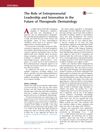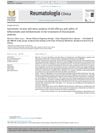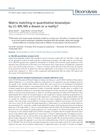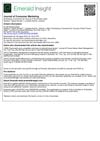 116 citations,
February 2017 in “Journal of the American Academy of Dermatology”
116 citations,
February 2017 in “Journal of the American Academy of Dermatology” JAK inhibitors help with skin conditions but need more research on dosing and safety.
 2 citations,
April 2021 in “Journal of Cosmetic Dermatology”
2 citations,
April 2021 in “Journal of Cosmetic Dermatology” Hair loss lowers young men's self-esteem, increasing social anxiety and affecting daily life.
 273 citations,
May 2017 in “The Lancet”
273 citations,
May 2017 in “The Lancet” Some drugs can cause rare but potentially deadly skin reactions, and early treatment and avoiding the drug again are key.
 3 citations,
November 2016 in “The journal of investigative dermatology/Journal of investigative dermatology”
3 citations,
November 2016 in “The journal of investigative dermatology/Journal of investigative dermatology” Entrepreneurial companies are key to advancing dermatology treatments and patient care.
 10 citations,
September 2022 in “Psychiatry and Clinical Neurosciences”
10 citations,
September 2022 in “Psychiatry and Clinical Neurosciences” Long COVID affects over half of COVID-19 survivors, causing a range of symptoms like fatigue and neurological issues, with no specific treatment yet.
 926 citations,
June 2010 in “BMC Medicine”
926 citations,
June 2010 in “BMC Medicine” Polycystic ovary syndrome is a complex condition that affects women's mental, reproductive, and metabolic health throughout their lives.
 April 2024 in “Pharmaceuticals”
April 2024 in “Pharmaceuticals” Bimatoprost helps with hair growth and eye conditions but can be costly and have side effects.
 37 citations,
September 2017 in “Reumatología Clínica”
37 citations,
September 2017 in “Reumatología Clínica” Leflunomide and methotrexate are equally effective for rheumatoid arthritis but have different side effects.
 74 citations,
January 1998 in “Dermatology”
74 citations,
January 1998 in “Dermatology” Men who think they are losing hair feel worse about themselves, especially if they are younger.
 18 citations,
April 2013 in “Inflammatory Bowel Diseases”
18 citations,
April 2013 in “Inflammatory Bowel Diseases” People with Inflammatory Bowel Disease often lose hair due to stress, medication side effects, or lack of nutrients, and treatment depends on the specific cause.
 8 citations,
June 2022 in “International Journal of Molecular Sciences”
8 citations,
June 2022 in “International Journal of Molecular Sciences” Tiny particles called extracellular vesicles show promise for skin improvement and anti-aging in facial care but face challenges like low production and lack of research.
 November 2012 in “South African Family Practice”
November 2012 in “South African Family Practice” The article concludes that early treatment of alopecia is crucial to prevent permanent hair loss.
 44 citations,
September 2015 in “Annals of Oncology”
44 citations,
September 2015 in “Annals of Oncology” Targeted cancer therapies have a significant but lower risk of causing hair loss compared to chemotherapy.
 2 citations,
December 2019 in “Bioanalysis”
2 citations,
December 2019 in “Bioanalysis” Accurate quantitative bioanalysis using LC-MS/MS is challenging due to matrix effects, but using internal standards and new methods like in-sample calibration could improve results.
 December 2023 in “Trials”
December 2023 in “Trials” The trial is testing if a helmet that uses light can prevent hair loss during chemotherapy.
 51 citations,
September 2015 in “Medical Clinics of North America”
51 citations,
September 2015 in “Medical Clinics of North America” The conclusion is that acne, alopecia, and hyperhidrosis are common skin issues with various treatments available, and accurate diagnosis is key for effective management.
 25 citations,
December 2015 in “Journal of the European Academy of Dermatology and Venereology”
25 citations,
December 2015 in “Journal of the European Academy of Dermatology and Venereology” Alopecia areata significantly lowers quality of life, especially in personal and social areas, and more so if the patient is also depressed.
 25 citations,
July 2019 in “Experimental Dermatology”
25 citations,
July 2019 in “Experimental Dermatology” Cholesterol balance is important for hair health, and problems with it can lead to hair loss conditions.
46 citations,
June 2015 in “American Journal Of Pathology” Diabetes causes lasting cell dysfunctions, leading to serious complications even after blood sugar is controlled.
 July 1988 in “Journal of The American Academy of Dermatology”
July 1988 in “Journal of The American Academy of Dermatology” Various dermatologic treatments were effective for skin conditions like acne, rosacea, hair loss, and psoriasis from December 1986 to December 1987.
 34 citations,
October 2014 in “European journal of pharmaceutics and biopharmaceutics”
34 citations,
October 2014 in “European journal of pharmaceutics and biopharmaceutics” The new drug delivery system releases the drug better in sebum and targets follicles more effectively than the conventional cream.
74 citations,
March 2006 in “Journal of Chromatography B” Hair analysis is promising for detecting drug misuse in livestock.
 10 citations,
January 2016 in “Dermatologic Clinics”
10 citations,
January 2016 in “Dermatologic Clinics” Some acne medications have side effects; doctors should educate patients and may not need to do frequent lab tests for all.
 22 citations,
November 2014 in “Psychiatric Clinics of North America”
22 citations,
November 2014 in “Psychiatric Clinics of North America” Stress can worsen skin conditions and affect mental health, so doctors should include stress management in skin treatment.
 16 citations,
February 1992 in “Journal of Consumer Marketing”
16 citations,
February 1992 in “Journal of Consumer Marketing” The authors suggest systematically sourcing new product ideas from various internal and external places to improve innovation.
 September 2023 in “Journal of Fluid Mechanics”
September 2023 in “Journal of Fluid Mechanics” The homogenization theory effectively describes how flow behaves differently across asymmetric membranes.
 53 citations,
June 2017 in “Skin appendage disorders”
53 citations,
June 2017 in “Skin appendage disorders” PRP treatment helps hair growth in most cases, but more research needed.
 141 citations,
September 2016 in “European Journal of Dermatology”
141 citations,
September 2016 in “European Journal of Dermatology” Taxane chemotherapy can cause skin, hair, and nail side effects, which are often under-reported and can affect patient quality of life.
May 2022 in “Journal of the Dermatology Nurses' Association” The convention highlighted the importance of comprehensive patient care and early diagnosis in dermatology.
 207 citations,
April 2006 in “Journal of The American Academy of Dermatology”
207 citations,
April 2006 in “Journal of The American Academy of Dermatology” Iron deficiency may be related to hair loss, but there's not enough evidence to recommend iron screening or supplements for all hair loss patients.



























